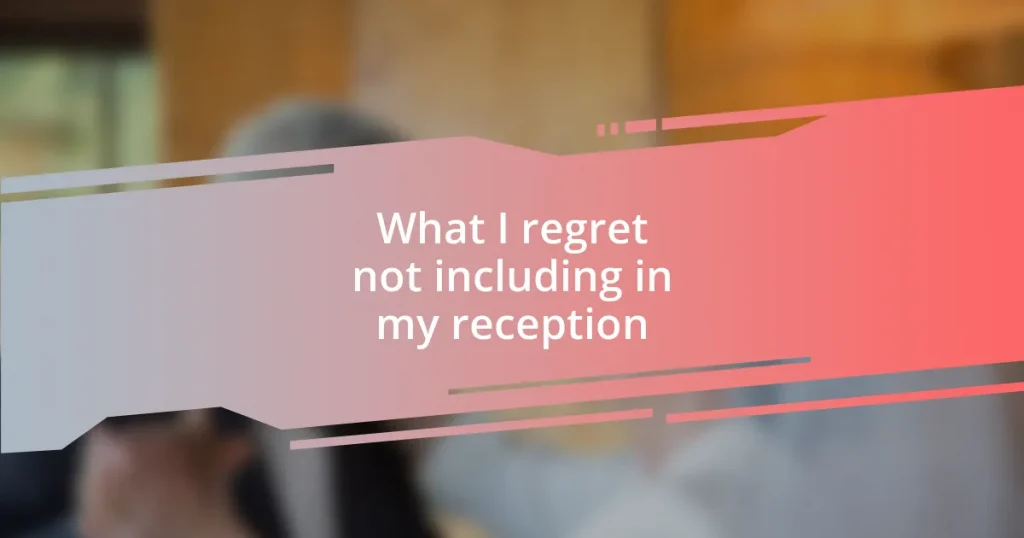Key takeaways:
- Creating a welcoming atmosphere and personal touch is essential for making guests feel at home.
- Identifying individual guest needs enhances the accommodation experience and fosters deeper connections.
- Effective communication and gathering feedback are crucial for improving guest satisfaction and tailoring offerings.
- Ensuring privacy and security builds trust, making guests feel more comfortable and valued during their stay.

Understanding Guest Accommodations
Understanding guest accommodations goes beyond just providing a bed for the night. I remember my first experience as a host; I was so focused on cleanliness and amenities that I nearly overlooked the importance of creating a welcoming atmosphere. Have you ever walked into a place that felt instantly like home? That feeling is what I strive to achieve for my guests every time.
One of the crucial aspects of guest accommodations is understanding different needs and preferences. I’ve learned through trial and error that not all guests have the same expectations. For instance, some guests treasure privacy and autonomy, while others crave interaction and local recommendations. How do you balance those desires to create a memorable stay for everyone?
Incorporating personal touches can transform an ordinary stay into an extraordinary one. I often leave little notes or snacks for my guests. The joy I see when someone finds a homemade treat speaks volumes. It’s these small gestures that can foster a sense of connection and make guests feel truly valued. How can you personalize your space to reflect warmth and care?

Identifying Guest Needs
Identifying guest needs is a fundamental step that shaped my hosting experience. Early on, I made the mistake of assuming that all guests appreciated similar amenities. I remember hosting a couple who were not only vegans but also had a strict routine for their morning rituals. They needed their space to prepare their food and enjoy quiet moments before exploring the city. By taking the time to understand their specific needs, I was able to provide a kitchen stocked with suitable ingredients and a serene environment conducive to relaxation.
Another time, I hosted a family with young children. It struck me how differently they approached their stay compared to solo travelers. The parents needed safety features and engaging activities, while the kids simply wanted a fun space to explore. This experience underscored the importance of asking the right questions before a guest’s arrival. I now ask potential guests about their preferences in advance, which not only prepares me but also shows them that their individual needs matter.
Ultimately, identifying guest needs leads to richer experiences. When I took the extra step to customize accommodations, I noticed that the connections I formed with my guests deepened significantly. One evening, a guest shared how finding a kids’ play area nearby made their stay hassle-free, allowing them to fully enjoy their family vacation. Have you ever considered how paying attention to guest preferences might enhance their overall experience?
| Guest Type | Key Needs |
|---|---|
| Solo Traveler | Privacy and local recommendations |
| Family with Children | Safety features and engaging activities |
| Couples | Romantic ambiance and leisure options |
| Business Travelers | Fast internet and workspace |

Designing Comfortable Spaces
Designing comfortable spaces is about more than just aesthetics; it’s about creating an inviting space that resonates with guests. I recall a time when I decided to change the color scheme in my guest room, opting for soft blues and warm neutrals. The feedback from guests was overwhelmingly positive—they often described the space as calming and cozy. It’s fascinating how colors and textures can set the mood, making guests feel instantly at ease.
To create that perfect atmosphere, consider these elements:
- Comfortable Bedding: Invest in high-quality mattresses and linens; it truly makes a difference.
- Soft Lighting: Use lamps or dimmers to create warm, inviting spaces in the evening.
- Functional Layout: Design the room to allow easy movement and accessibility, focusing on the flow of the space.
- Natural Elements: Incorporate plants or natural materials to bring a touch of nature indoors.
- Personal Touches: Add unique decor items that tell a story and spark conversation, like local artisan crafts.
When guests feel comfortable and relaxed, their experience shifts from just a stay to a memorable retreat. I remember a guest telling me how they never wanted to leave my nook because it felt like a second home, and that’s the ultimate compliment. Crafting such environments is rewarding, and it deepens the connection guests form with their stay.

Creating Personalized Experiences
Creating personalized experiences is all about tailoring the stay to each guest’s unique preferences. One time, I had a guest who mentioned how much they loved late-night snacks. So, I surprised them by stocking the kitchen with their favorite treats. The joy on their face when they discovered those goodies made it clear to me that small gestures can go a long way in making someone feel truly valued and at home.
I’ve also found that adding a personal welcome note can make a world of difference. After hosting a couple celebrating their anniversary, I decided to leave a little handwritten card wishing them a happy celebration. They later told me how much it meant to them, reinforcing the idea that simple, thoughtful touches elevate their overall experience. Have you ever tried personalizing your communication with guests? It’s amazing how even a few words can create a sense of belonging.
Additionally, I’ve experimented with gathering feedback after each stay. After accommodating a guest with allergies, I asked for their thoughts on my efforts to provide a safe environment. They appreciated my willingness to learn what worked for them, commenting that it made their stay not just pleasant but genuinely comforting. Listening to guests and acting on their feedback has become a key part of my hosting philosophy. What if we all took that extra step to really listen and adapt? The potential for creating memorable experiences is enormous.

Ensuring Privacy and Security
Ensuring privacy and security for guests is foundational to a positive experience. I’ve always made it a priority to install high-quality locks on doors and windows, giving my guests peace of mind. One memorable instance was when I had a guest who arrived late at night. They expressed concerns about feeling secure in an unfamiliar place. I assured them of the advanced security measures I put in place, and seeing their tension ease was a gentle reminder of the importance of these details.
I’ve also learned that communication plays a pivotal role in fostering trust. After one guest asked about my cleaning procedures, I took the opportunity to explain how I maintain a meticulous standard of cleanliness while respecting their personal space. Sharing these practices openly helped the guest relax and feel more at home. Have you ever thought about how transparency can strengthen a guest’s trust? I realized that the more I shared, the more comfortable my guests felt about settling in.
Additionally, I ensure that guest information is handled with utmost discretion. I remember once facilitating a booking for a high-profile individual—they appreciated my commitment to safeguarding their privacy. I implemented secure processes for handling their details, which not only reassured them but also heightened my reputation as a responsible host. In what ways are you safeguarding your guests’ personal information? It’s a game changer that can significantly enhance the overall trust and rapport between hosts and guests.

Effective Communication Strategies
Effective communication strategies are essential in making guests feel welcomed and understood. I remember a time when I initiated a pre-arrival email detailing everything from check-in procedures to local attractions. One guest responded with questions about nearby dining options, and this sparked an engaging back-and-forth that revealed their culinary preferences. By the time they arrived, I felt like I had already made a connection, which made their stay that much more enjoyable. Don’t you think those initial chats can set the tone for the entire experience?
Additionally, I find that being responsive during a guest’s stay can significantly enhance their comfort level. A guest once texted me with a minor issue regarding the Wi-Fi connection late one evening. I quickly replied and resolved it, and they expressed gratitude for the swift response. I’ve learned that timely communication can ease concerns and build a rapport, allowing guests to feel like they’re not just a number but valued individuals.
Furthermore, I always encourage open lines of communication through various channels, whether it’s via text, phone, or in-person. I recall a family who preferred to communicate through a shared messaging app during their stay; it allowed them to quickly ask questions and receive updates. It not only improved their comfort but also showcased my flexibility as a host. Have you considered how accommodating different communication methods can influence a guest’s experience? Adapting to their preferences can truly make a lasting impression.

Gathering Feedback for Improvement
Gathering feedback is an integral part of improving guest accommodations. I often send out quick surveys after a stay, asking guests for their thoughts on various aspects of their experience. One time, I received a suggestion to include more hangers in the closet. It might seem trivial, but implementing that small change made several future guests feel more at home, showing how even the slightest tweaks can lead to a more enjoyable stay.
When I chat with guests in person, I pay close attention to their feedback and thoughts. I remember hosting a couple who shared how much they loved the local coffee shop I’d recommended. Their excitement prompted me to compile a little guide of local gems, which I now share with all my guests. I can’t help but wonder, how many potentially great insights are you missing by not having those conversations?
Moreover, I encourage guests to leave reviews after their visit, but I also follow up personally with a thank you email. One guest once wrote a heartfelt note about how my accommodations helped them through a tough time. It struck me deeply, reinforcing my commitment to creating a warm and welcoming environment. Have you ever thought about how feedback could illuminate paths for growth you hadn’t considered? Embracing this input can truly transform your hosting journey, turning occasional visitors into repeat guests.















